Catholic Charities Hawai‘i (CCH) may not be new — in fact, the nonprofit has been serving people of all faiths and cultures in Hawai‘i since 1947. But there are many aspects of the organization and services available that go well beyond what one might associate with its name. From transportation to veterans’ services, housing and more, CCH provides much-needed programs statewide as part of the largest private network of social service organizations in the US, serving around 40,000 people every year. Because of the wide breadth of services CCH provides, we spoke with some of the principal staff members who make a difference in our communities.
Strengthening Families, Then and Now
After World War II, communities in Hawai‘i were devastated and families were broken apart. In 1947, Sister Victoria Frances Lamour of the Maryknoll Sisters came from New York with several other sisters trained in social work and founded CCH. Their initial work was strengthening and reuniting families, and placing children who were separated from their families following one of the largest and deadliest conflict in history.
“Over time, CCH continued to respond to community needs,” says President and CEO Tina Andrade, “and there are now over 50 different programs and services statewide, with about 335 team members.”
Because CCH serves people of all ages, their work is organized into four divisions: Family and Therapeutic Services Division which provides counseling and child welfare services; Youth Enrichment Services Division which provides behavioral services for youth; Housing and Referral Programs Division which provides housing and veteran services; and Community and Senior Services Division which provides community-based services for older adults and legal immigration services.
“Primarily, all of these deal with reunifying, strengthening and building familial bonds,” says Tina.
Tina herself has been involved with CCH for over 21 years. A graduate of Chaminade University, initially she worked as a director focusing on the agency’s mission and history. She also was a Catholic school teacher, helping youth stay grounded in their values and encouraging them to understand how their values relate to their life choices. “That’s been my work over a lifetime,” says Tina. “I like to describe my work as removing barriers, opening doors and creating conversations to help us reflect on our mission and values. That approach to work is always from a perspective of strengthening people.” Although a lot of Tina’s day-to-day tasks involve meetings and organizing schedules, “the value-centered approach brings people together with important conversations based on our values.”
Overseeing the Community and Senior Services Division is Diane Terada, whose time with CCH totals 30 years. She has been involved in aging programs for the duration of her professional career, with a license in social work and a diploma from the University of Hawai‘i. An example of CCH’s mission to serve people of all cultures and faith, Diane is one of the non-Catholics who works for CCH. “There are many of us who
are not necessarily Catholic. And we do not, of course, only serve Catholic people. We believe in our mission to serve those in need.” Diane attests to the fact that what CCH seeks in potential team members is their ability to embody and support the mission to serve.
As Division Administrator, Diane manages the senior-specific programs which aim to help seniors remain independent in the community for as long as possible. Their community/senior services’ goal is to ensure people stay out of institutional settings whenever possible. Emphasizing the importance of advocacy for their clients, the various staff who represent CCH’s services in all four divisions have one common goal: to carry out their work with dignity, compassion, social justice and a commitment to excellence.
SENIOR SERVICES
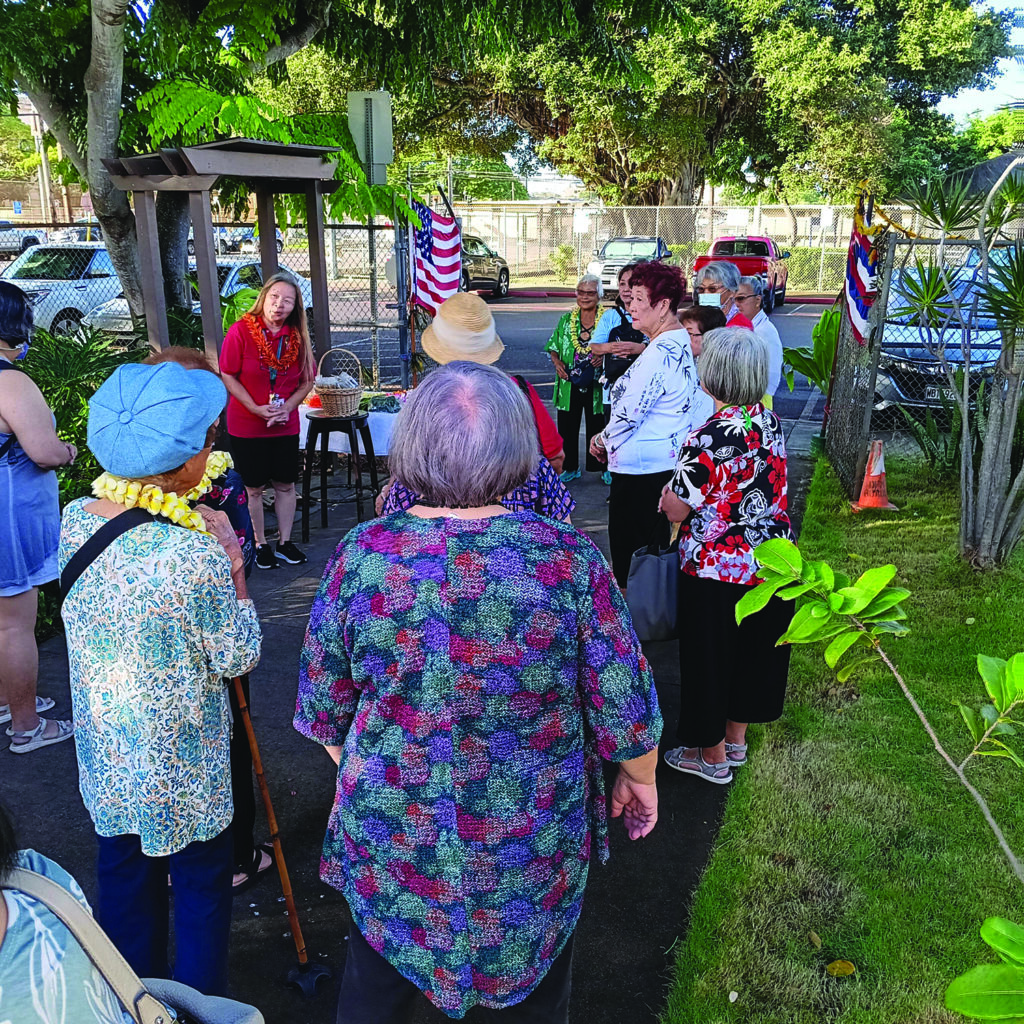
Lanakila Multi-Purpose Senior Center
The Lanakila Multi-Purpose Senior Center (LMPSC) is the largest and oldest senior center in Hawai‘i, created by the State of Hawai‘i in 1969 as the Hawai‘i State Senior Center and operated by Honolulu Community College until 1981. The state then asked CCH to operate the center, which became the Lanakila Multi-Purpose Senior Center. The LMPSC serves seniors aged 60 and older, promoting health and independence while organizing over 4,000 activities each year. Cultural club activities, special events, excursions, educational workshops, presentations and service projects are a part of this mix. The center offers over 60 classes every week — pickleball, ping pong, tai chi, yoga, hula, line dancing, stretch and tone, tap dancing, calligraphy, ukulele, guitar, online and more. Program Director Susie Chun Oakland adds, “Our senior center members are truly enjoying themselves. They feel valued. They have so much life experience, knowledge and a lot to contribute to our community. We are so fortunate to have such great people at our center.”
Lanakila’s staff of five employees and over 700 volunteers are the heart of this program. Many ideas for activities are a collaborative effort between staff and seniors. “Our center members feel comfortable making suggestions for new activities or improving existing programs. When I came to the senior center, I also really wanted this to be a food, flower and fern hub, not only for seniors, but for the community,” says Susie. For over seven years, every part of the LMPSC campus has flourished with flowers, fruit and vegetables to be used for activities that senior members can utilize. Susie stresses the importance of food sustainability and self-sufficiency. “When our center sees a community need, the members and staff make a wholehearted effort to address it.”
In a heartwarming example, she tells the story of how the City and County of Honolulu was short about 10,000 lei for veterans’ gravesites at Punchbowl. “The seniors made 4,000 ti leaf lei two years ago in partnership with the city’s Department of Parks and Recreation and made over 10,000 lei last year to honor our veterans.” The folks at LMPSC are committed to seniors’ health, wellbeing and independence for all.
Case Management Program
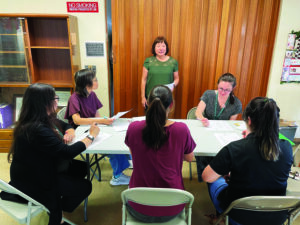
Program for the Elderly, leads a discussion with
her team of case managers.
Judy Taketa is the program director of CCH’s Case Management Program for the Elderly, which assists elders in stabilizing their home and introduces any services that may be of assistance. The purpose of this program is to enable living a quality life free from fear of being homeless and/ or losing independence, learning options of what one can do about their health concerns. The case managers provide for client needs and matters of health and advocacy. “Sometimes,” Judy says, “when a doctor asks how they’re doing, they’ll first say, ‘I’m fine.’ However, there is so much that the senior does not say. They don’t know what or how to share with others, or are fearful that they would be considered senile or incapable of caring for themselves. We are the in-between to ensure we inform anyone of the issues on their behalf and what help they might need.” The program also offers linkages to home-delivered meals, transportation, health insurance and assistance in the home — all to ensure independence.
The program also works with families and caregivers of elderly clients, as support is crucial in caring for their loved ones. Caregivers and families often don’t know what options exist nor how to access them to care for their loved ones. Meetings with clients are one-on-one to suit a person’s unique situation and needs. CCH’s website has training videos and webinars that anyone can access. In addition, Judy’s team members are all master-level social workers. “Every day brings different challenges and different questions. My team is pretty good at maneuvering that as we try to be the connection between housing management, community, and resources.” Judy has worked with the elderly for about 30 years and enjoys working with them because, in her own words, “I’ve learned so much about who they are and what the future may hold. People shouldn’t be afraid of getting older. The future is bright. It’s all about how people visualize themselves.”
Benefits Enrollment Center
With a 2019 grant from the National Council on Aging, the Benefits Enrollment Center is a one-stop place to receive assistance through a variety of benefits, including help preparing for tax season by collecting information and documents; healthcare programs under Medicaid; obtaining coupons to access healthy food; and prescription drug discount programs (part of Medicare and SNAP). Peter Reyes, program director of the center, has been with CCH for 30 years. When Peter left the Army, he didn’t know where to start, so he began working with CCH. “I started as an intaker. My original plan was to stay with the agency for six months tops. Thirty years later, I’m still here. When people ask me why, I say I believe in the services we provide and how we make a difference in the lives of those we serve.”
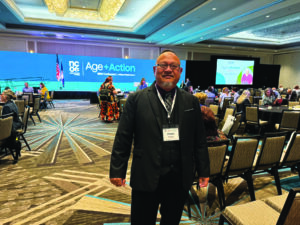
National Council on Aging conference in
Arlington, Va. He represented CCH’s
Benefits Enrollment Center, gaining valuable insights
on improving access to benefits for the community.
Peter and his staff collaborate with other entities, such as the Walmart Foundation grants through Catholic Charities USA, which helps with funding for outreach for SNAP education. “The outreach is significant,” says Peter. “It’s all about maximizing the benefits to help our kūpuna afford to live here.” Peter and his staff represent the center by having tables and booths at various conventions and events; doing in-service presentations to other service providers; and handing out flyers and informational brochures at food distribution events at various Hawai‘i Food Bank food pantries.
Transportation Services
Peter is also the program director of the transportation services that CCH offers. The two main programs are Transportation Friends for Kūpuna (TFK), a volunteer-driven privately funded service that offers one-on-one assistance to seniors, and their Transportation Service Program (TSP), which is a contracted service with the City and County of Honolulu’s Elderly Affairs Division. The services provide the state-funded Kūpuna Care Transportation service for individual frail seniors as well as the federally funded Title III Transportation Service that provides group grocery shopping and excursions. TFK complements their regular transportation service by having TFK volunteers available weekends and holidays when the regular transportation services may be closed. Peter calls TFK door-through-door service as opposed to door-to-door because volunteers assist clients from within the home to within their destinations.
CCH’s regular transportation service has been ongoing since 1975, with qualified drivers and a fleet of vehicles from walk-on vans with wheelchair lifts to minivans and sedans. Eligibility for both services differs: TFK’s clients are usually elders who are more frail and require individualized careful attention while regular service is more for individual and group rides. Clients must be 60 and older to qualify for both services. Peter notes that while there are other rideshare services on the market today, CCH provides programs designed for kūpuna — the staff is vetted, reliable and trained. “Being that Honolulu is one of those areas where there’s lots of kūpuna, the need for specialized senior transportation will continue. That’s what we do. We take our kūpuna safely to wherever they need to go to make sure they remain safe, healthy and can continue to live independently.”
Housing Assistance Program
As program coordinator for the Housing Assistance Program, Crystal Kalima-Gascon has been working with seniors for seven-and-a-half years. The program helps seniors in need of affordable housing and helps them with matters of eligibility, how to apply, affordability and how long they will be on a waitlist, as waitlists for affordable housing usually span a year or two. The program serves seniors aged 60 and older, providing them with application help and CCH’s O‘ahu Housing Guide (OHG), an annually updated list of affordable senior housing including information regarding rent, utilities, waitlist times and amenities. Because many seniors are low-income, the program staff helps them determine which places they qualify for. Crystal and the program also manage the three Small Group Homes (SGH), which are living spaces sharing common areas and house responsibilities for seniors aged 62 and older. The SGH is one solution to the program’s waitlist. Rent is on a sliding scale basis. While some seniors choose to live there indefinitely, others live in SGH in the interim while waiting for affordable housing availability.
May Alcaide, a 74-year-old resident of the SGH, is living her best life as she waits for affordable housing to open up. May has endured hardship. So her sister helped her apply for housing. “I told them of the situation and Crystal was the coordinator. She helped me with all of that.” When asked how she felt about co-ed living, May was a bit skeptical at first. “I said, okay, I’ll go check it out. That’s the chance you take in life, yeah?” When asked about her routine while living in the SGH, May says, “Me, I get plenty hobbies. I crochet, I read, I watch videos and then I go out and get fresh air because we have a park and a pond. I talk with my neighbors. I keep myself mentally and physically busy, and on days when I feel not good, I stay indoors and check our household and what needs to be done.” May sets an example in encouraging her age group, other ku¯puna, to take advantage of every opportunity. “Chance it. Just chance, ‘cause you may never get to again.”
Hawai‘i Circle of Care for Dementia
Jody Mishan is subcontracted by CCH to coordinate the agency’s federal dementia grant, the second grant they have received to advocate for elders with dementia and their caregivers. In 1999, Jody was taking care of her father, who had a combination of Alzheimer’s disease and Lewy body dementia. She brought her father back with her from Florida and was his primary caregiver for eight years until he passed. In that time, she noted that services were low-quality or not available. “I started advocating here and there for caregivers at the legislature,” she says. Jody was then hired by the Executive Office on Aging to coordinate the first state plan on Alzheimer’s and related dementias. That work is continuing today.
CCH’s Hawai‘i Circle of Care for Dementia continues to ensure that Hawai‘i’s unpaid dementia caregivers have access to training for a better understanding of behavioral challenges related to dementia. The project targets persons with dementia who live alone, and those living with intellectual/developmental disabilities who are at higher risk of developing Alzheimer’s. The project wants to bring awareness to the
ways that dementia affects the individual and their families, and develops resources for folks both enduring dementia/early symptoms and their families and caregivers. The Circle of Care works with Queen’s Geriatric Services to provide additional support, emphasizing the importance of working closely with specialists who can accurately screen for symptoms and prognoses.
Some of the available resources include the SHARE and REACH programs. The SHARE (Support, Health, Activities, Resources, Education) program is evidence-based and works with persons with dementia who are at the early stage, and their care partners. REACH Community is another evidence-based program which provides one-on-one coaching for caregivers. CCH is also working with the Alzheimer’s Association to develop a support group for those with early symptoms. “You need to know you’re not alone in this,” says Jody, noting that staying connected is paramount to a sustainable life.
VOLUNTEER SERVICES
Phone-A-Friend
Lyn Moku is the program volunteer coordinator for CCH’s Memory Mentor and Phone-A-Friend programs of the senior services division. Lyn has been with CCH for five years, but has been with nonprofits for over 30 years. Phone-A-Friend is a program for seniors aged 65 and older who are living alone with little to no caregiver support, who also have health problems that prevent them from socializing. Volunteers call clients and have friendly conversations with them. “And hopefully,” says Lyn, “in the process, they develop trusting friendships. Most of our volunteers who have been matched with a senior have stayed with the same senior for as long as they’ve been in the program.” Lyn and the volunteers look forward to expanding their services and connecting more kūpuna with volunteers — friends who care.
Memory Mentor
Lyn is also the volunteer coordinator of the Memory Mentor program, a service for those living alone or with little to no caregiver support, who may show symptoms of memory loss, confusion or dementia or have a diagnosis of dementia. A volunteer will go to a client’s home for a friendly visit. Clients may be totally homebound or may leave home infrequently. Volunteers may also provide shopping services and help the client assess their mail, keeping bills and important items and disposing of junk mail and possible fraud material. Volunteers also help with reminders, such as medication schedules, doctor appointments and birthdays.
Another benefit of both the Memory Mentor and Phone-A-Friend programs is that they give caregivers respite “even if it’s just a phone call or a visit,” and provide wellness checks.
Both the Memory Mentor and Phone-A-Friend programs receive many referrals through public health nurses, discharge planners at hospitals, geriatricians and nonprofits, as well from Aloha United Way and VolunteerMatch.
Looking at the future of the programs, Lyn expresses a desire to expand services island-wide. “There are quite a few people who live out of Honolulu proper, but we don’t have volunteers who live in those outlying areas, so being able to recruit those volunteers to service the rest of the island will only help us grow the program and meet the needs of the people.”
Transportation Friends for Kūpuna (TFK)
Julie Chang is the program volunteer coordinator for Transportation Friends for Ku¯puna. The program’s clients are ku¯puna aged 60 and older, who are unable to drive. When the program started, volunteers driving their own cars primarily took clients to medical and dental appointments, but services have now grown to include grocery shopping and other types of errands. When clients want to request a driver, Julie suggests they call her at least two weeks in advance, in order to give her adequate time to find an available volunteer. Drivers sometimes also chaperone/escort clients who need assistance into the doctor’s office or store, as TFK emphasizes door-through-door service versus simply door to-door.
Julie, like Lyn, wants to expand their services island-wide, especially in areas like Waianae and the west side of O‘ahu, where volunteers may be less available than they are in more populated areas. “I’m just so happy with the volunteers that I want to brag about them a little bit.” She goes on to tell the story of a couple giving a client a ride to the dentist. When the client let the volunteers know she was not feeling well, they encouraged her to seek medical attention when she was hesitant. She ended up being admitted to the hospital for two days and was immensely grateful that the volunteers were able to advocate on her behalf. That same client ended up needing a variety of radiation treatments, so other volunteers stepped up to transport her. Julie recalls being moved at how “the volunteers cared and made the time to be there for her.”
One stellar volunteer driver is Lori Harrison, who started driving for TFK at the beginning of last year after going through CCH’s orientation. Lori feels she is making a difference for someone every time she provides a ride. This care and attention is the most fulfilling part for Lori. Whether it’s a ride, a phone call or a visit, what Julie, Lyn and the volunteers champion is that meaningful connection with our island kūpuna.
SERVICES FOR ALL AGES
Counseling Center
CCH’s Counseling Center features various programs. The largest is general counseling, where anyone can get therapy at a price they can afford. Program Director Chiyo Churchill is a licensed marriage and family therapist. After leaving CCH to start her own practice, she returned because she feels at home at CCH. She’s been with CCH for 15 years total. Much of the center team’s work is keeping up with funding sources for the program and creating new programs to reach more people. They interface with the community and other CCH programs, always ensuring that they are working toward the same goal: ensuring their clients have somewhere and someone to turn to.
Chiyo also sees clients to stay in touch with the therapeutic world. “It’s very rewarding,” she says. Chiyo and the other center therapists balance learning from the latest research and applying their learning through providing trauma-informed care, while understanding that “real life happens, too.” When clients miss sessions, Chiyo emphasizes empathy and patience. “We want them to know we’re not going anywhere. We’ll be here for them whenever they’re ready.”
A newer center program is Kūpuna to Kamali‘i, based in Waianae and now also growing on Maui. The program’s foundations are based in being culturally appropriate, and recognizing their clients’ generational or cultural trauma, “from Kūpuna to the kamali‘i, the children. Recognizing how important family is for us islanders, especially the Native Hawaiian community, is why we focused on the west side,” Chiyo says. She and her team want to give people the opportunity to experience therapy in a way that feels more like talking story. “It’s important for people to feel safe in their community, and it’s hard to do when people are still dealing with so much.” In striving to be a vital resource and a place of acceptance, Counseling Center staff exemplify care and aloha.
Veterans Services
Dianne Lim-Tam is CCH’s program administrator of the Service Members, Veterans and their Families (SMVF) unit. Its three main programs are Supportive Services for Veteran Families (SSVF), the SSG Fox Suicide Prevention Grant Program (SPG) and Legal Services for Veterans (LSV). SSVF staff help with housing searches, landlord mediation, temporary financial assistance, emergency housing and assistance in accessing US Department of Veterans Affairs (VA) health benefits toward gaining and maintaining permanent housing. SPG is unique. The program is not only for veterans, even though it is funded by the VA, but also for active service members who need resources and suicide prevention services, which include peer support, transportation assistance, child care assistance, healthcare navigation, financial literacy education and access to mental health and substance abuse treatment options. LSV is the newest program of the three and helps veterans who are homeless or are at risk of homelessness with legal issues. After determining eligibility, CCH connects the veteran with attorneys to help them with military discharge upgrades, divorce, custody, landlord-tenant issues, foreclosures and more. The program can also pay the client’s attorney fees. Dianne emphasizes sustainability as one of the program’s goals. Consistency is vital in helping veterans and their families sustain independent living.
Dianne has been with CCH for over seven years. She began on Hawai‘i Island, working in a transitional housing program. She returned home to O‘ahu and eventually rejoined CCH, serving in an administrative role. She feels that she is right where she belongs, serving those who served our country.
Dianne and her team also do a lot of outreach. “We go out to the Daniel K. Akaka Clinic in Kapolei once a month, at least, and when veterans are coming in for their appointments, they stop by our booth and ask questions about the kind of services they may need.” For Dianne, this outreach is instrumental in expanding their services and ensuring the community knows about these programs and the benefits that they offer.
The passion and expertise of CCH’s staff are reflected in the smiles of their clients, young and old. For Tina, what motivates her every day when facing challenges in her work is the care demonstrated by the staff and the way that they serve each client with personal, thoughtful attention. “They see people as individuals with dignity,” she says. “They embody our mission.”
Tina and Diane are hopeful about expanding CCH’s services to neighbor islands. Regardless of age, faith or culture, CCH has embodied their mission to achieve social justice with a commitment to excellence for 78 years and beyond.
For information about programs, donations and volunteering, visit catholiccharitieshawaii.org. Call the Senior Intake Line at 808-527-4777 or the Main Help Line at 808-521-4357.

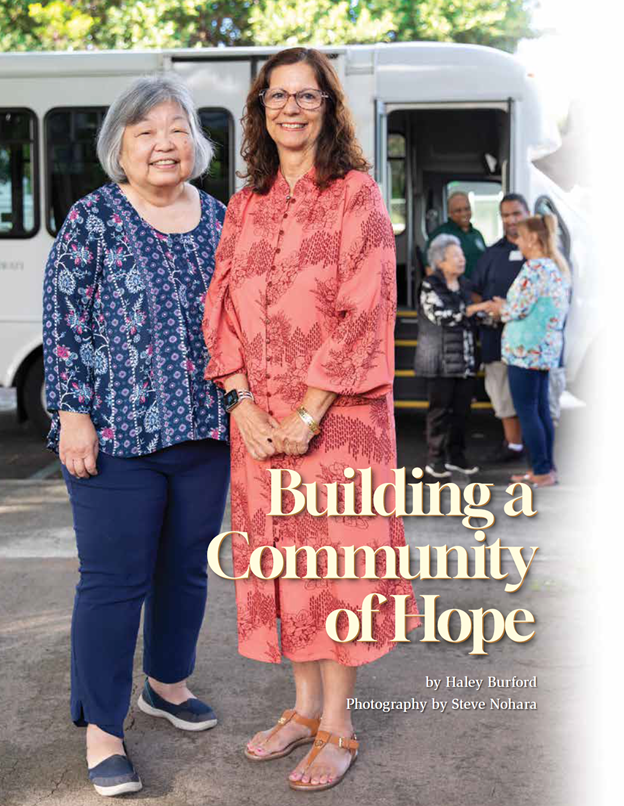
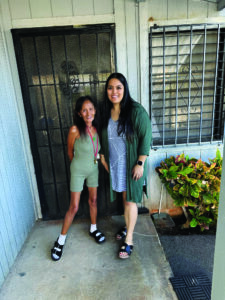
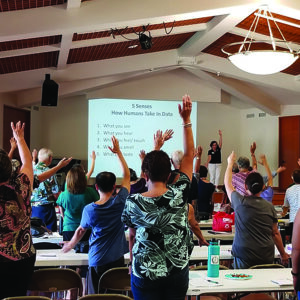
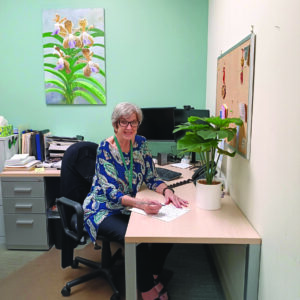
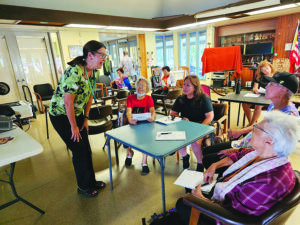
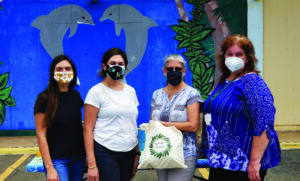
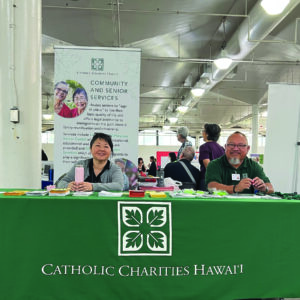

Leave a Reply